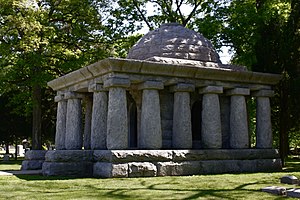tomb
Jump to navigation
Jump to search
English[edit]
Etymology[edit]

From Middle English tombe, toumbe, borrowed from Old French tombe, from Latin tumba from Ancient Greek τύμβος (túmbos, “a sepulchral mound, tomb, grave”), probably from Proto-Indo-European *tewh₂- (“to swell”).
The verb is from Middle English tomben.
Pronunciation[edit]
Noun[edit]
tomb (plural tombs)
- A small building (or "vault") for the remains of the dead, with walls, a roof, and (if it is to be used for more than one corpse) a door. It may be partly or wholly in the ground (except for its entrance) in a cemetery, or it may be inside a church proper or in its crypt. Single tombs may be permanently sealed; those for families (or other groups) have doors for access whenever needed.
- A pit in which the dead body of a human being is deposited; a grave.
- c. 1591–1595 (date written), William Shakespeare, “The Tragedie of Romeo and Ivliet”, in Mr. William Shakespeares Comedies, Histories, & Tragedies […] (First Folio), London: […] Isaac Iaggard, and Ed[ward] Blount, published 1623, →OCLC, [Act III, scene v]:
- As one dead in the bottom of a tomb.
- One who keeps secrets.
- 1912, Fyodor Dostoyevsky, translated by Constance Garnett, The Brothers Karamazov, published 1880, Book III, chapter 4:
- I never told anyone about it. You're the first, except Ivan, of course—Ivan knows everything. He knew about it long before you. But Ivan's a tomb.
Derived terms[edit]
Descendants[edit]
Translations[edit]
small building or vault for the remains of the dead
| ||||||||||||||
Verb[edit]
tomb (third-person singular simple present tombs, present participle tombing, simple past and past participle tombed)
- (transitive) To bury.
Catalan[edit]
Etymology[edit]
Pronunciation[edit]
Noun[edit]
tomb m (plural tombs)
- turn (change of direction)
- turn, twist (movement around an axis)
- turn (change of temperament or circumstance)
- walk, stroll
Derived terms[edit]
Further reading[edit]
- “tomb” in Diccionari de la llengua catalana, segona edició, Institut d’Estudis Catalans.
Middle English[edit]
Noun[edit]
tomb (plural tombes)
- Alternative form of tombe (“tomb”)
Categories:
- English terms inherited from Middle English
- English terms derived from Middle English
- English terms derived from Old French
- English terms derived from Latin
- English terms derived from Ancient Greek
- English terms derived from Proto-Indo-European
- English 1-syllable words
- English terms with IPA pronunciation
- English terms with audio links
- Rhymes:English/uːm
- Rhymes:English/uːm/1 syllable
- English lemmas
- English nouns
- English countable nouns
- English terms with quotations
- English verbs
- English transitive verbs
- en:Archaeology
- en:Burial
- Catalan deverbals
- Catalan terms with IPA pronunciation
- Catalan terms with homophones
- Catalan lemmas
- Catalan nouns
- Catalan countable nouns
- Catalan masculine nouns
- Middle English lemmas
- Middle English nouns